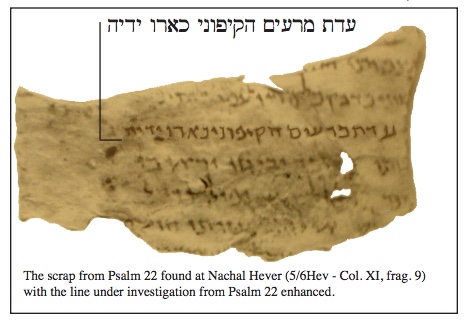by Tim Hegg
This is only part of an original post. To see the full post, which you should do, visit https://torahresource.com/psalm-2216-like-lion-pierced/
Download this article in PDF format by Clicking Here
An ancient controversy has surfaced once again in our times. It revolves around the text of Psalm 22:16 (verse 17 in the Hebrew). In the Hebrew Masoretic text, the verse reads: “For dogs have encircled me, an evil congregation surrounded me; like a lion my hands and my feet.” The Lxx translation, however, did not read the Hebrew word כָּאֲרִי, kā’ari, “like a lion” but rather כָּאֲרווּ ka’aru, “they dug,” and thus they translated the word with the Greek word ὢρυξαν, ōruxsan, “they dug” or “they pierced.” The difference was whether the original word ended with a vav or a yod. Virtually all English translations (except those offered by Jewish publications) have followed the Lxx translation instead of the Masoretic text, giving us the well-known phrase, “they pierced my hands and my feet.”
To some this appeared as an obvious example of Christian translators choosing to follow the Lxx because it fit their messianic interpretation of the passage, disregarding the clear reading of the Hebrew original. What is more, the Lxx was accused of changing the original to bolster the Christian interpretation of the Psalm.
Unfortunately, the Psalms Scroll found at Qumran did not include 22:16[17] because the manuscript was damaged at the very place where it would have appeared. The pre-Masoretic text seemed lost forever. That is, until recently.
Scraps from a scroll containing some of the Psalms were discovered at Nachal Hever, and one scrap contained the line from Psalm 22:16 with the word in question well in view. Though the writing on the scrap was faint, under magnification it was easy to see and decipher. The word clearly ended in a vav not a yod, and was therefore a 3rd person plural verb: “they dug” or “they pierced.” Here was evidence that the Lxx translators had not “fooled” with the text, but had faithfully translated the Hebrew original that was before them. Since this scrap is dated (in accordance with the style of letters used) to 50-68 CE, it is almost 1000 years earlier than the Aleppo Codex, the earliest extant manuscript of the Masoretic text, and shows that in at least one of the earliest Hebrew traditions of Psalm 22, the word is not “like a lion” but “they dug” or “pierced.” Dr. Peter Flint, who published the principle edition of the scrap, notes that in the Herodian script, “vav and yod are usually distinguished, with vav generally longer than yod.”1 Indeed, in this instance, we have a perfect example for comparison, since the very next letter following the word in question is a yod: “my hands” (ידיה). The last letter of ka’aru is without doubt a vav when compared with the beginning letter of the next word which is clearly a yod. Here, then, is a Hebrew manuscript, pre-Christian, with “they dug” or “they pierced.”
